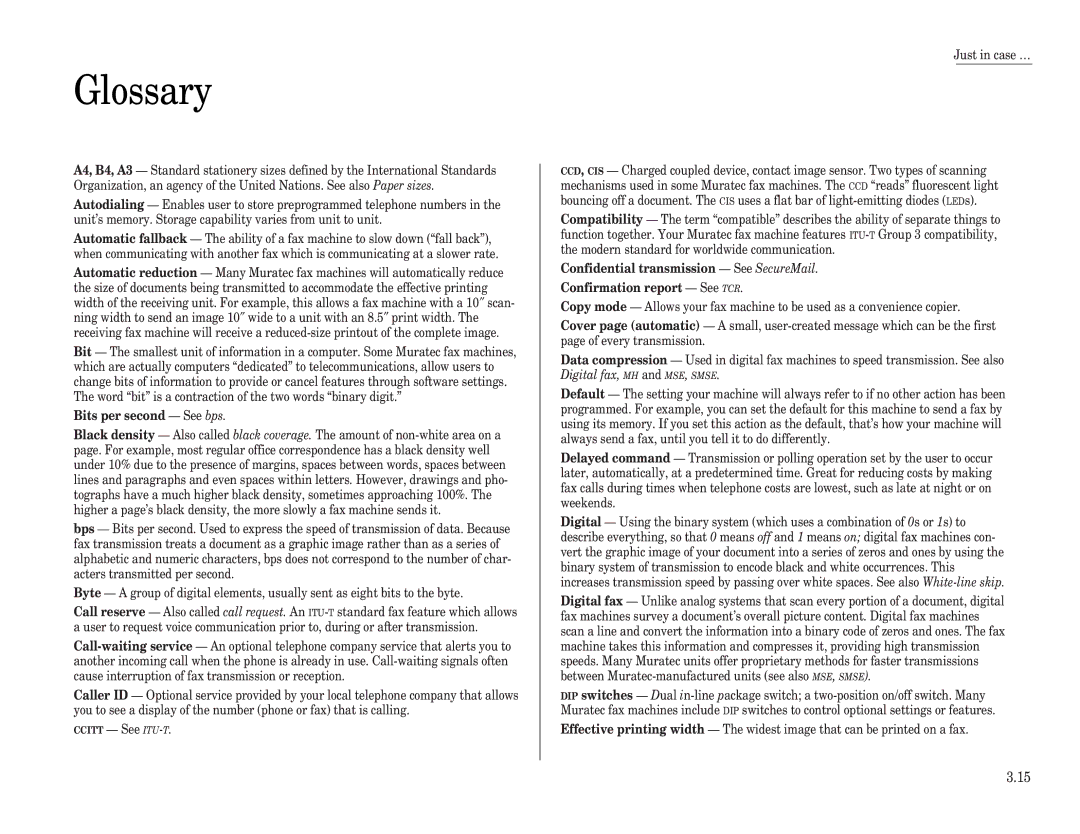
Just in case …
Glossary
A4, B4, A3 — Standard stationery sizes defined by the International Standards Organization, an agency of the United Nations. See also Paper sizes.
Autodialing — Enables user to store preprogrammed telephone numbers in the unit’s memory. Storage capability varies from unit to unit.
Automatic fallback — The ability of a fax machine to slow down (“fall back”), when communicating with another fax which is communicating at a slower rate.
Automatic reduction — Many Muratec fax machines will automatically reduce the size of documents being transmitted to accommodate the effective printing width of the receiving unit. For example, this allows a fax machine with a 10″ scan- ning width to send an image 10″ wide to a unit with an 8.5″ print width. The receiving fax machine will receive a
Bit — The smallest unit of information in a computer. Some Muratec fax machines, which are actually computers “dedicated” to telecommunications, allow users to change bits of information to provide or cancel features through software settings. The word “bit” is a contraction of the two words “binary digit.”
Bits per second — See bps.
Black density — Also called black coverage. The amount of
bps — Bits per second. Used to express the speed of transmission of data. Because fax transmission treats a document as a graphic image rather than as a series of alphabetic and numeric characters, bps does not correspond to the number of char- acters transmitted per second.
Byte — A group of digital elements, usually sent as eight bits to the byte.
Call reserve — Also called call request. An
Caller ID — Optional service provided by your local telephone company that allows you to see a display of the number (phone or fax) that is calling.
CCITT — See
CCD, CIS — Charged coupled device, contact image sensor. Two types of scanning mechanisms used in some Muratec fax machines. The CCD “reads” fluorescent light bouncing off a document. The CIS uses a flat bar of
Compatibility — The term “compatible” describes the ability of separate things to function together. Your Muratec fax machine features
Confidential transmission — See SecureMail.
Confirmation report — See TCR.
Copy mode — Allows your fax machine to be used as a convenience copier.
Cover page (automatic) — A small,
Data compression — Used in digital fax machines to speed transmission. See also Digital fax, MH and MSE, SMSE.
Default — The setting your machine will always refer to if no other action has been programmed. For example, you can set the default for this machine to send a fax by using its memory. If you set this action as the default, that’s how your machine will always send a fax, until you tell it to do differently.
Delayed command — Transmission or polling operation set by the user to occur later, automatically, at a predetermined time. Great for reducing costs by making fax calls during times when telephone costs are lowest, such as late at night or on weekends.
Digital — Using the binary system (which uses a combination of 0s or 1s) to describe everything, so that 0 means off and 1 means on; digital fax machines con- vert the graphic image of your document into a series of zeros and ones by using the binary system of transmission to encode black and white occurrences. This increases transmission speed by passing over white spaces. See also
Digital fax — Unlike analog systems that scan every portion of a document, digital fax machines survey a document’s overall picture content. Digital fax machines scan a line and convert the information into a binary code of zeros and ones. The fax machine takes this information and compresses it, providing high transmission speeds. Many Muratec units offer proprietary methods for faster transmissions between
DIP switches — Dual
Effective printing width — The widest image that can be printed on a fax.
3.15
